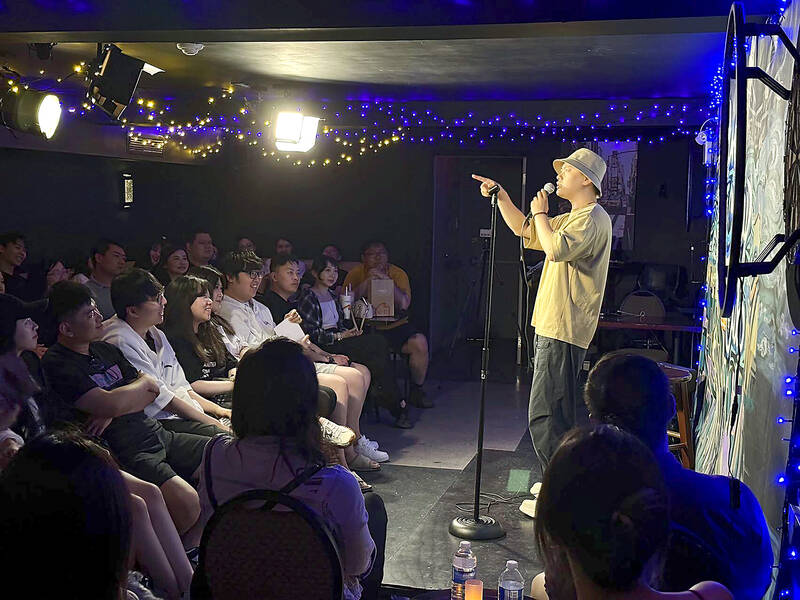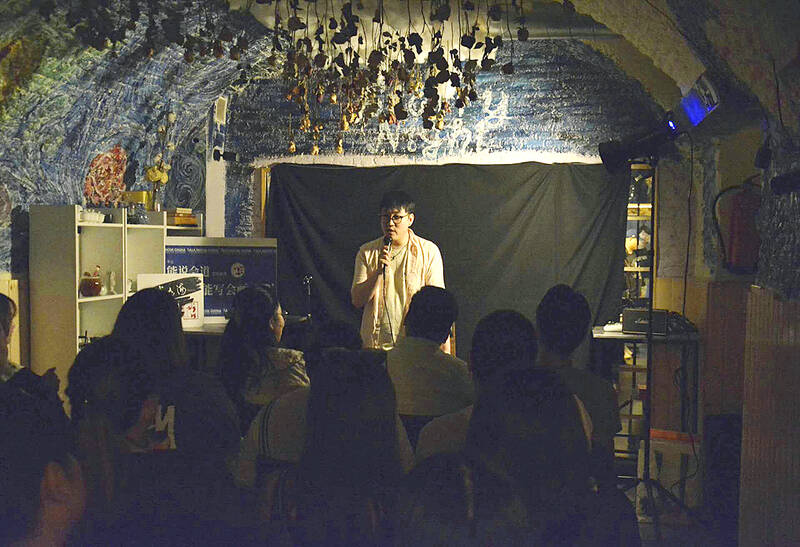Comedian Xi Diao says he knows he should avoid talking politics on stage, but sharing a family name with Chinese President Xi Jinping (習近平) makes it hard to resist.
Even his name is politically sensitive, the Melbourne-based amateur comedian tells audiences, setting up a joke about a group chat on the Chinese messaging service WeChat being shut down as soon as he joined it.
The 33-year-old civil engineer gets nervous laughs whenever he breaks a de facto rule of Chinese comedy: Don’t say anything that makes China look bad. To most comedians, that means no jokes about censorship, no mentioning the president’s name and no discussion of China’s extraordinarily strict COVID lockdowns or social topics like domestic violence.

Photo: AP
“It is a pity, if the environment were open, there would be somebody world-class coming up,” Xi said.
Mandarin-language standup comedy is growing, and not just in China. The medium has taken off in the last decade, and China’s expatriate population has established clubs in cities like New York, Tokyo and Madrid.
Comedians are known for bristling at limits, but most Mandarin-language comedians, and many fans, say some topics have no place in the comedy club.

Photo: AP
In China there are censors who review jokes in advance, and punish performers who cross political red lines. Earlier this year, an entertainment company was fined about US$2 million when star comedian Li Haoshi (李昊石) made a joke that referenced a Chinese military slogan.
Overseas, comedians say they don’t fear punishment, but most say political jokes aren’t funny, or make people uncomfortable. Many are not very familiar with political humor, after growing up in a country that largely censors it.
“We make what the audience likes,” said Guo Jia, a businessman who runs a comedy club in Tokyo. He said discomfort with politics is part of Chinese culture, comparing it to sensitivities about race in the US.
“There are some areas where people won’t go, but it’s not typically because of government policies, but more social pressure or culture or religion,” said Michel Hockx, a professor of Chinese Literature and director of the Liu Institute for Asia and Asian Studies in University of Notre Dame.
Comedians do push on social boundaries.
For Lin Dongxiao, a 28-year-old comedian who began performing while living in Toronto, it was a chance to talk in public about a congenital disorder that causes limp, and to get crowds laughing with him about how Chinese society treats people with disabilities.
Lin, who performs under the stage name “Guazi,” told an audience that women he met online complained that he didn’t warn them he had a disability, so he added it to his dating profile.
“You’re scrolling … oh gym trainer, nice body; business executive, million-dollar salary; and then…third-class certificate of disability without any allowance.” People burst into laughter.
Standup fan Wenlai Cai, a Los Angeles-based software engineer in her early 30s, said that she enjoys hearing jokes about LGBTQ life and race relations, topics that are strictly off limits in the mainland.
But “there should be limits on (jokes about) high level politics” Cai said. “That is, political leaders, partisanship … I don’t think it’s meaningful to talk about.”
There are also a few venues that defy Beijing’s sensibilities. Women’s Idea, a feminist group in New York City, hosts uncensored comedy shows that often hit on politics, encouraging women to express themselves on social and political issues.
But even roundabout references to politics make most Chinese-language audiences uncomfortable, Xi said. After he performed at a Chinese restaurant in Australia, the owner asked him to be careful; at a standup competition, he got zero audience votes. He’s wound up performing almost exclusively at English-language venues.
Zhu Jiesheng, who runs a standup comedy club in Madrid, reviews other performers’ jokes before they go on stage, asking them to strike jokes that could cross political lines.
But when a comedian insisted on telling jokes about the Shanghai lockdown, Zhu didn’t stop him. The audience didn’t get the jokes, Zhu said, and it started arguments backstage, leaving him more convinced that politics and comedy don’t mix.
Comedians are very aware that people can get into trouble for what they say. Asked about Li Haoshi, comedians said he should have known better.
“Even if you do not make mistakes but someone else does, it affects the whole industry,” said Zhong Di, a 30-year-old student in Milan who also performs standup.
Lin, who recently moved back to China to pursue a career in standup, said the industry is still recovering from the crackdown set off by his joke.
The Associated Press couldn’t reach Li for comment, and the company that manages him didn’t respond to an interview request.
China has a record of harassing its nationals abroad for activism. It has also threatened international stars from abroad with boycotts or bans on performing in China. Nigel Ng, a Malaysian comedian based in the UK who created the popular character “Uncle Roger,” lost his Chinese social media accounts after a clip from a live show went viral in which he joked about China listening in through cell phones.
Vicky Xu, a Chinese-born journalist in Australia who also performs standup in English, said that Chinese people have a long history of cracking jokes about sensitive topics.
“If you look back at a lot of the movies or TV shows made in China like 20, 30 years ago, there are more political jokes than today. So how do you explain that?” she said.
Xu, whose work is critical of the Chinese government and who has received blistering blowback from China’s official media and nationalist trolls, said that politics affects people’s lives in China so much that not talking about it is “ignoring the elephant in the room.”
When comedians go back to China, they face restrictions beyond what they impose on themselves overseas.
Lin said censorship is important to prevent “chaos,” but submitting his material to censors weeks before performances is still a challenge.
“No one told me what I could say or not,” said Lin, “which is pretty hard. I just hand in whatever I have, and change it if it doesn’t get approved.”
In Australia, Xi doesn’t plan to stop kidding about his famous namesake.
“I’m nobody,” Xi said, “and after all, I have an Australian passport … I will keep telling these jokes.”

In Taiwan’s politics the party chair is an extremely influential position. Typically this person is the presumed presidential candidate or serving president. In the last presidential election, two of the three candidates were also leaders of their party. Only one party chair race had been planned for this year, but with the Jan. 1 resignation by the currently indicted Ko Wen-je (柯文哲) of the Taiwan People’s Party (TPP) two parties are now in play. If a challenger to acting Chairman Huang Kuo-chang (黃國昌) appears we will examine that race in more depth. Currently their election is set for Feb. 15. EXTREMELY

Last week saw the appearance of another odious screed full of lies from the People’s Republic of China (PRC) Ambassador to Australia, Xiao Qian (肖千), in the Financial Review, a major Australian paper. Xiao’s piece was presented without challenge or caveat. His “Seven truths on why Taiwan always will be China’s” presented a “greatest hits” of the litany of PRC falsehoods. This includes: Taiwan’s indigenous peoples were descended from the people of China 30,000 years ago; a “Chinese” imperial government administrated Taiwan in the 14th century; Koxinga, also known as Cheng Cheng-kung (鄭成功), “recovered” Taiwan for China; the Qing owned

Jan. 20 to Jan. 26 Taipei was in a jubilant, patriotic mood on the morning of Jan. 25, 1954. Flags hung outside shops and residences, people chanted anti-communist slogans and rousing music blared from loudspeakers. The occasion was the arrival of about 14,000 Chinese prisoners from the Korean War, who had elected to head to Taiwan instead of being repatriated to China. The majority landed in Keelung over three days and were paraded through the capital to great fanfare. Air Force planes dropped colorful flyers, one of which read, “You’re back, you’re finally back. You finally overcame the evil communist bandits and

They increasingly own everything from access to space to how we get news on Earth and now outgoing President Joe Biden warns America’s new breed of Donald Trump-allied oligarchs could gobble up US democracy itself. Biden used his farewell speech to the nation to deliver a shockingly dark message: that a nation which has always revered its entrepreneurs may now be at their mercy. “An oligarchy is taking shape in America of extreme wealth, power and influence that literally threatens our entire democracy, our basic rights and freedoms,” Biden said. He named no names, but his targets were clear: men like Elon Musk